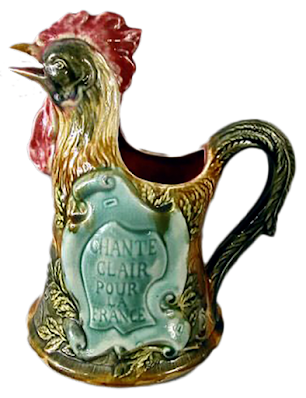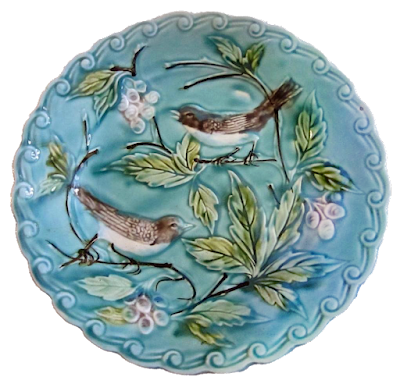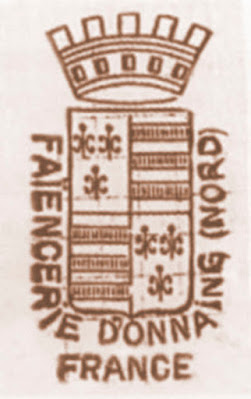La Faïencerie d’Onnaing was founded in Onnaing, France, by Charles, Knight de Bousies, his brother and his cousin Frederick, Baron of Sécus in February of 1821. The three had previously owned the pottery of Nimy-Les-Mons in Belgium and decided to open a second location in France they called Frie Onnaing.
In 1827, Alexandre Giraud, acquired the pottery and ran it with his brother Charles Giraud. The two potteries remained in their control until Jean-Pierre and Jean-Baptiste Mouzin became administrators in 1858.
The company produced only earthenware faience from its founding until 1838. After this they experimented with a number of different bodies, importing clays from England and other areas in Europe. Their main production remained in plain or simply decorated earthenware and transfer decorated pottery for everyday use— sanitary wares, serving, etc.
Around 1870 the company entered the majolica market in a grand way with the production of floral and figural majolica pitchers; vases and jardinieres; smoking paraphernalia; banks; plates, strawberry sets and asparagus sets. It is for their colorful majolica that they are best remembered today.
Onnaing pieces have a color palette as well as a similar decorative style to those at the pottery of Nimy-Le-Mons. Flowers were a central theme of their jardinieres and vases although animals were sometimes incorporated into these jardinieres as well.
Onnaing Mogador jardiniere
Onnaing majolica Eléphants jardiniere
Onnaing Roses Moussues jardiniere
Onnaing majolica Lions jardiniere
Onnaing majolica floral jardiniere
Onnaing majolica Roses Trémières jardiniere
Onnaing Pavots jardinirere
Onnaing Citrouilles jardiniere
Onnaing majolica Les Perruches jardinière
Onnaing majolica Chataignes jardiniere
Onnaing majolica jardiniere
Onnaing majolica Pensées Vaporisé
Onnaing majolica Cyclamen
Onnaing majolica Celtiques
Onnaing majolica Clochettes jardiniere
Onnaing majolica jardiniere Chrysanthèmes
Onnaing majolica jardiniere Lyonnaise
Onnaing majolica Chasse jardiniere
Onnaing majolica Poisson jardiniere
Onnaing Poissons jardiniere
Onnaing majolica Le Victorieux jardiniere
Onnaing majolica Jardinière Pensées
Onnaing majolica vase 3 Tulipes
Onnaing majolica vase Lyonnais
Onnaing majolica vase Fleurs en Relief
Onnaing majolica duck wall pocket
Onnaing pitchers generally take three forms: floral, animal and character. All of these had catalog numbers impressed on the base and many of these had names, usually descriptive in nature, that were used in-house. Pitchers are usually glazed with a deep red interior lining.
Onnaing majolica Cyclamens pitcher
Onnaing majolica Clématites pitcher
Onnaing majolica Egyptien pitcher
Onnaing majolica pitcher Fougères
Onnaing Breloques pitcher
Onnaing majolica Coligny pitcher
Onnaing majolica Lierre pitcher
Onnaing majolica Capucines
Onnain Dentelles majolica pitcher
Onnaing majolica Papillons jug
Onnaing majolica Eventail jug
Onnaing majolica Perdrix
Onnaing majolica pitcher Lilas
Onnaing majolica
Dahlias pitcher
Onnaing majolica pitcher Vallauris
Onnaing majolica
Roses Tremieres pitcher
Onnaing majolica Libellules jug
Onnaing majolica pitcher Cœur
Onnaing majolica Asperges pitcher
Onnaing majolica pitcher Flamand
Onnaing Bouledogue Marque Mepoco Ware
Onnaing majolica Hôtelier jug
Onnaing majolica Coq Chante Clair Pour La France
Onnaing majolica Cochon au jambon pitcher. Also made by Orchies
Human character jugs, for which the company became famous, are common figures from everyday life or well known persons from French history.
Onnaing majolica L'alliance Franco-Russe pitcher
Onnaing majolica Marianne jug
Onnaing character jug Moine
Onnaing majolica P. Renoulède jug
Onnaing La Jupe Culotte jug
Onnaing majolica Jeanne D'Arc jug Onnaing majolica Chemin De Fer figural pitcher
Onnaing majolica Réserviste jug
Onnaing majolica Francisco Ferrer figural Pitcher
Onnaing plates are usually cheerful and colorful.
Onnaing majolica Dessous de Plat Plumes de Paon
Onnaing majolica Corinthe Plate
Onnaing majolica Fraises plate
Onnaing Jeanne D'Arc plate
Onnaing majolica plate Escargots
Onnaing majolica plate Feuilles de Vigne
Onnaing majolica plate Roses
Onnaing majolica plate Oiseaux
Onnaing majolica Huîtres plate
Onnaing majolica Asperges plate
Onnaing majolica Asperges server
Onnaing strawberry plate
Onnaing strawberry server
Onnaing also made small banks for children, usually in whimsical forms.
Onnaing catalog page showing some banks
Onnaing Panier bank
Onnaing majolica Chien Basset bank
Onnaing majolica Ecureuil bank
They also made humidors and smoking sets.
Onnaing majolica humidor, Eléphants
Onnaing majolica humidor, Têtes de Lion
Onnaing majolica Camélia humidor
Onnaing majolica smoking set
The company made a small number of larger pieces for the home such as umbrella stands and pedestals.
Onnaing majolica Bambous umbrella stand.
Also made in a version with an attached monkey
Onnaing majolica pedestal and jardiniere Colonne Louis XV
In 1900 the pottery came under the administration of Hans Mouzin. In 1914 the pottery was damaged during World War 1 and ceased the production of majolica. The pottery resumed production in 1921 and operated until 1938 when the factory closed. The facility was permanently liquidated by 1947.
Onnaing majolica pieces are easily found because of the company’s large output. They also had a strong export business to the United States. It is estimated that over a million pieces were potted there. They are sometimes marked with the name of the pottery, sometimes with the company shield, sometimes with an impressed starburst, sometimes with an impressed French horn, and sometimes with only a catalog number. If they were made between 1890 and 1909 they also include the word FRANCE. After 1910 they are marked MADE IN FRANCE.











































































































No comments:
Post a Comment